Known for its stunning beaches and rolling green hills, Norfork Island in Australia is a beautiful place that attracts many people from all over the world. If you wish to travel there, passport requirements will vary depending on your citizenship. In this blog, we will help you figure out if you need a passport to enter Norfolk Island.
Where Is Norfolk Island?
Norfolk Island is a small island territory of Australia in the South Pacific Ocean. It lies about 1,412 km (877 mi) east of Evans Head in Australia and about 900 km (560 mi) from Lord Howe Island. It is known for its unique history, beautiful landscapes, subtropical climate and peaceful atmosphere, which is a destination for travelers seeking a break from the fast pace of modern life.
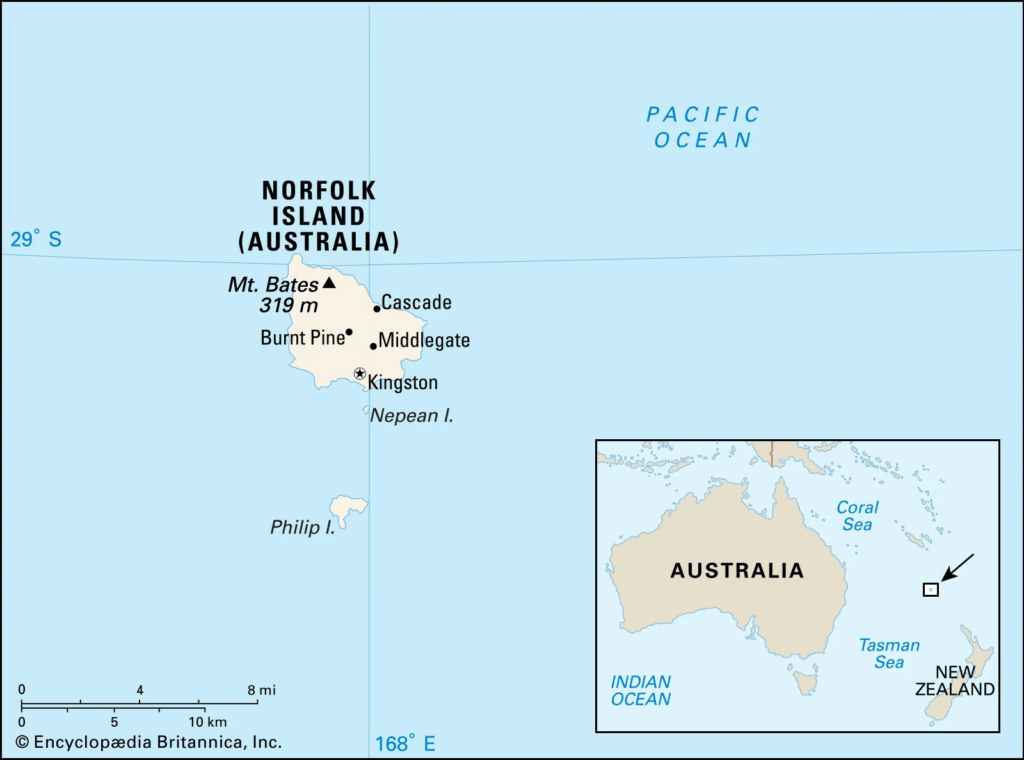
Do You Need a Passport to Go to Norfolk Island?
According to Immigration and Border Protection, not every traveler needs to show a passport when entering Norfolk. It will depend on where you are from. Here you can check these two situations:
Australian citizens
Passports are not mandatory for Australian citizens traveling to Norfolk. However, you are required to show technically photographic identification with your full name to identify yourself, such as a passport, driver’s license and ID card. It is recommended that you take a passport to avoid some delays with manual checks or in case of flight diversion.
Australia permanent resident
Non-Australian citizens must use a passport as their form of identification. According to Australian Customs and Immigration, Australian permanent residents are required to show a valid passport at entry and departure.
What Documents Do Australians Need to Enter Norfolk Island?
Since Norfolk Island is part of Australia, the entry requirements for Australians are different from the for foreigners. Before Australians enter Norfolk Island, you must show the necessary photographic identification, such as:
- An Australian passport
- An Australian Driver’s Licence
- Proof of Age card
- The current Norfolk Island Identity Document.
- Customs and quarantine.
- Medical Insurance Recommendation
If you are an Australian permanent citizen, you are required to submit the following requirements:
- A valid passport
- A valid visa
- The flight ticket
Norfolk Island Entry Requirements for Australians
The Norfolk Island entry process is straightforward for Australians, as it is part of Australia. Before you plan to travel to Norfolk Island as an Australian citizen, you should follow these simple instructions below to prepare for the entry requirements and start a hassle-free journey to this beautiful island destination.
You need to book your flights to Norfolk Island. Airlines like Qantas regularly service the route. It is recommended that you book your tickets in advance, especially during peak travel seasons.
When you pack your luggage, you must follow strict biosecurity rules. Avoid packing restricted items such as fresh fruit, vegetables, plants, seeds, and animal products unless declared.
You should prepare the required documents mentioned above, such as a government-issued photo ID, Australian driver’s license, passport and Health Insurance Consideration. No visa is required for Australians.
What to Learn Before Traveling to Norfolk Island
Before traveling to Norfolk Island, it’s helpful to learn about its unique features, history, and practical travel tips to ensure a smooth and enjoyable visit. Here’s a guide to the weather, accommodation, time zone and other details about Norfolk Island.
Norfolk Island Weather
Norfolk Island has a subtropical climate, offering mild temperatures and pleasant weather throughout the year. Here’s a breakdown of the Norfolk Island weather.
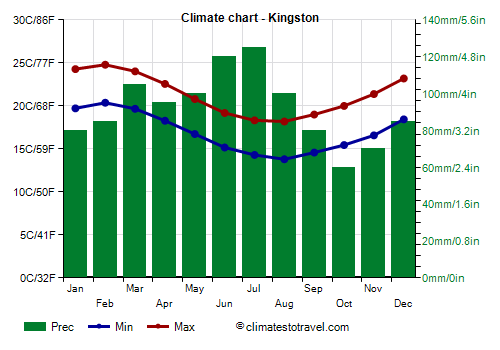
- Summer is from December to February. It is warm and sunny, with occasional humidity. It is perfect for beach activities and outdoor exploration.
- Autumn is from March to May. It is cooler and calmer, with less rainfall, which is great for hiking and other outdoor activities.
- Winter is from June to August. It is usually mild and cool, with occasional showers. It’s never too cold, but evenings can feel brisk.
- Spring is from September to November. During this time, you can enjoy the fresh and pleasant, with blooming flowers and clear skies.
Norfolk Island Accommodation
Norfolk Island offers a variety of accommodation options to suit different tastes and budgets, such as Seaview Norfolk Island, The Tin Sheds, Governor’s Lodge Resort Hotel, Cumberland Resort and Spa, and more. You can make an appointment online by choosing the apartment, date of stay, and type of Norfolk Island accommodation.
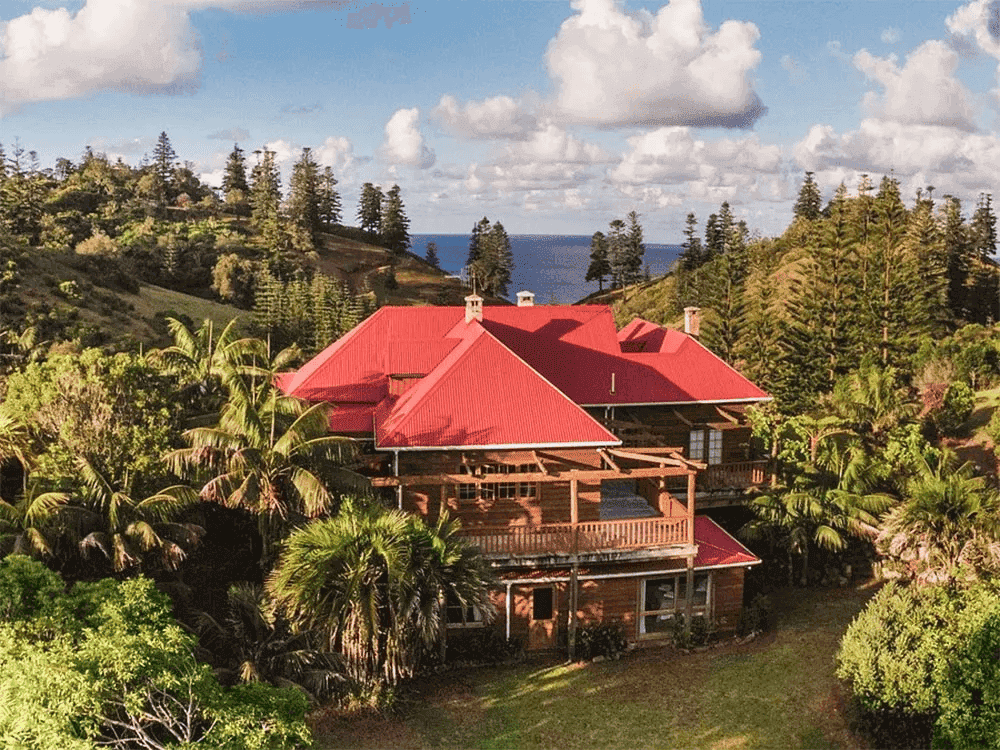
Norfolk Island Time Zone
Norfolk Island operates in its own time zone: Norfolk Island Time (NFT). The Norfolk Island is always one hour ahead of Australian east-coast places.
Standard Time: UTC+11 (11 hours ahead of Coordinated Universal Time).
Daylight Saving Time: Norfolk Island (UTC+12) observes daylight saving time.
Norfolk Island Flights
There are many airlines from Australia and New Zealand. Before you book the flight, you can compare the price. It is better to order your ticket one or two weeks before your trip to avoid the price increase.
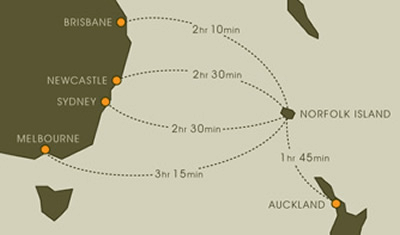
Qantas Airways
There are regular and scheduled flights from Sydney and Brisbane. From Sydney (SYD), the flight duration is approximately 2.5 hours. Usually 2-3 flights per week.
From Brisbane (BNE): The flight duration is approximately 2 hours. Frequency: 2-3 flights per week, with additional flights during peak travel periods.
Air Chathams
It flies directly from Auckland to Norfolk Island. The current schedule is Monday and Thursday. The flight takes approximately 2 hours and 45 minutes. Economy class is the only available seating option for this route.
Norfolk Island Cruise
Norfolk Island Cruise offers a unique experience of this remote, scenic destination in the South Pacific. There are several cruise lines, such as P&O Cruises, Azamara, and Ponant. These cruises often depart from cities such as Sydney, Brisbane or Auckland and range in duration from 6 to 16 nights or more.
Norfolk Island Attractions
Norfolk Island has stunning scenery and a range of natural and historic Norfolk Island attractions. Here are some of the most famous places to visit: Emily Bay, Kingston and Arthur’s Vale Historic Area (KAVHA), Norfolk Island National Park, Captain Cook Lookout, The Hundred Acres Reserve, Anson Bay, and The Norfolk Island Botanical Gardens and so on.
What’s the Best Time to Visit Norfolk Island?
If you want to visit Norfolk Island, you can travel there at the best time. The best time to visit Norfolk Island depends on your preferences for weather, activities, and crowd levels. Of course, the spring and summer time will be the best time to travel Norfolk Island, since the weather is warm and humid with temperatures between 21-26°C (70–79°F). During this time, you can enjoy a long sunny day and do outdoor activities such as hiking. However, this is the peak tourist time, so accommodation and flights may be more expensive.
If you want to avoid crowded travel, you can choose autumn time (March to May). The weather is warm and calm with temperatures around 19–24°C (66–75°F). It is ideal for water activities such as swimming, snorkeling, and fishing.
8 Things to Do on Norfolk Island
Norfolk Island offers a wealth of unique experiences that highlight its natural beauty, history, and cultural heritage. On this beautiful island, there are some great sights and activities that you can’t miss. Here are 8 things that you should do on Norfolk Island.
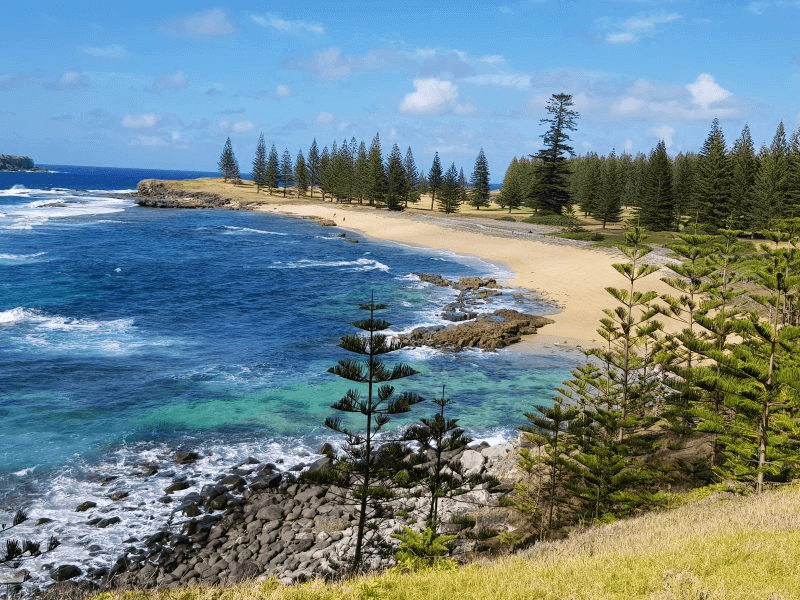
- Visit this UNESCO World Heritage site to explore the ruins of convict-era buildings, cemeteries, and museums.
- You can discover stunning trails through rainforests and enjoy panoramic views of Mount Pitt and Mount Bates. Birdwatching is also popular here.
- It is recommended that you purchase multi-use tickets to visit interesting museums and explore history and culture.
- It is a good idea to enjoy an authentic local dining experience by visiting multiple homes for different courses of a meal. It’s a great way to meet locals and learn about their lifestyle.
- You can visit Sunday Markets to find locally made crafts, souvenirs, and artistic goods.
- Explore excellent fishing spots and diving locations, so you will get a chance to catch or see an array of fish.
- You can see iconic trees, Norfolk pine trees. The towering beauty is a must-see for nature lovers.
- You can discover local cruise and taste the island’s specialties, such as fish fries and fresh seafood.
FAQ
Is norfolk island part of Australia?
Yes. Under the Norfolk Island Act 1979, Norfolk Island is an external territory of Australia in the Pacific Ocean between New Zealand and New Caledonia.
Do Australians need travel insurance for Norfolk Island?
Yes. You should obtain Norfolk Island travel insurance before you travel. Travel insurance has great benefits in terms of protection against flight modification or cancellation, additional expenses, loss of luggage or personal belongings, excess rental car insurance, travel delay, loss of income, disability, accidental death and personal liability.
Do Australian mobile phones work in Norfolk Island?
Yes, the Australian mobile phone can work in Norfolk Island. Norfolk Island operates with a 3G/4G mobile network and has public WiFi access areas available around the island. Although Norfolk Island is an Australian territory, some providers treat it as a separate region for billing purposes. To avoid unexpected costs, verify roaming charges with your provider or consider using a local SIM card.
How long can I stay in Norfolk Island?
The length of time you can stay on Norfolk Island depends on your citizenship or visa status. For Australian citizens, there is no time limit to stay on Norfolk Island. No special visa or permit is required. However, if you are a foreigner, the length of stay is determined by the type of Australian visa you hold.
Conclusion
As part of Australia, Norfolk Island is a unique and charming destination that offers a blend of natural beauty and rich history. It welcomes both domestic and international travellers. Don’t forget to check immigration rules before planning your trip to Norfolk. We hope you will explore and create unforgettable memories.